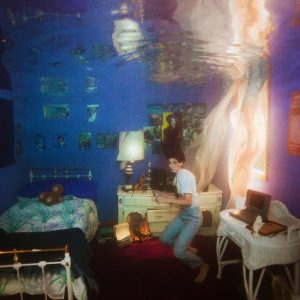
By Tyler Arnold
During the summer, while I was hiding in my home, avoiding any form of human contact—which, admittedly, isn’t too different from how I usually live—I stumbled across an absorbing music artist by the name of Natalie Mering, or Weyes Blood, as she’s known professionally (taken from the novel Wise Blood by Flannery O’Connor). Although I’ve since come to enjoy all of her music, her fourth studio album, Titanic Rising, was the one that struck a chord with me, especially when I was sealed away from the rest of the world with nothing but my wandering mind to keep me company.
With so many historic events happening just outside my window, Mering’s music served as a sort of release, a tranquil oasis where I could lounge about—swimming in the depths of haunting melodies, basking in the warmth of her soothing voice—and forget not only where I was but who I was. Her musical style is very similar to George Harrison, and her vocals contain echoes of Joni Mitchell and Karen Carpenter, artists whose works are timeless.
And yet Mering’s sound is unique, incredibly distinguished, quite unlike anything I’ve heard. The entirety of Titanic Rising feels experimental; at times it carries a lilting, dreamlike quality—one very reminiscent of psychedelia from the 1960s—and in other moments, it introduces sweeping synthesizers which feel very grand and orchestral.
I think Mering’s music affected me so much because I discovered it during a time when I was trying to become more daring and exploratory, particularly in regard to my own writing. In the same way that she wasn’t afraid to employ multiple genres—noise, rock (both soft and experimental), baroque pop—I was inspired to try and write within multiple genres myself.
While listening to the album, I began working on a piece that was simultaneously a Bildungsroman, a mystery-thriller, and a psychological horror. This departure from what I usually write really helped put my interests and goals into perspective; I would prefer to be known as a writer who writes outside of what is expected. As an artist, one of my greatest fears is that people who read and enjoy my work will grow to anticipate certain things from me, that they will place expectations (which, when referring to artistic endeavors, is just a nice word for limitations) on what I can and will write. I think I’m afraid of that notion because I’m already used to feeling constrained by the expectations of others. So that’s why I fight it. That’s why I try to prove people wrong. That’s why I try to keep them guessing. And I’m glad Mering’s music was around to help me reach that mindset.
